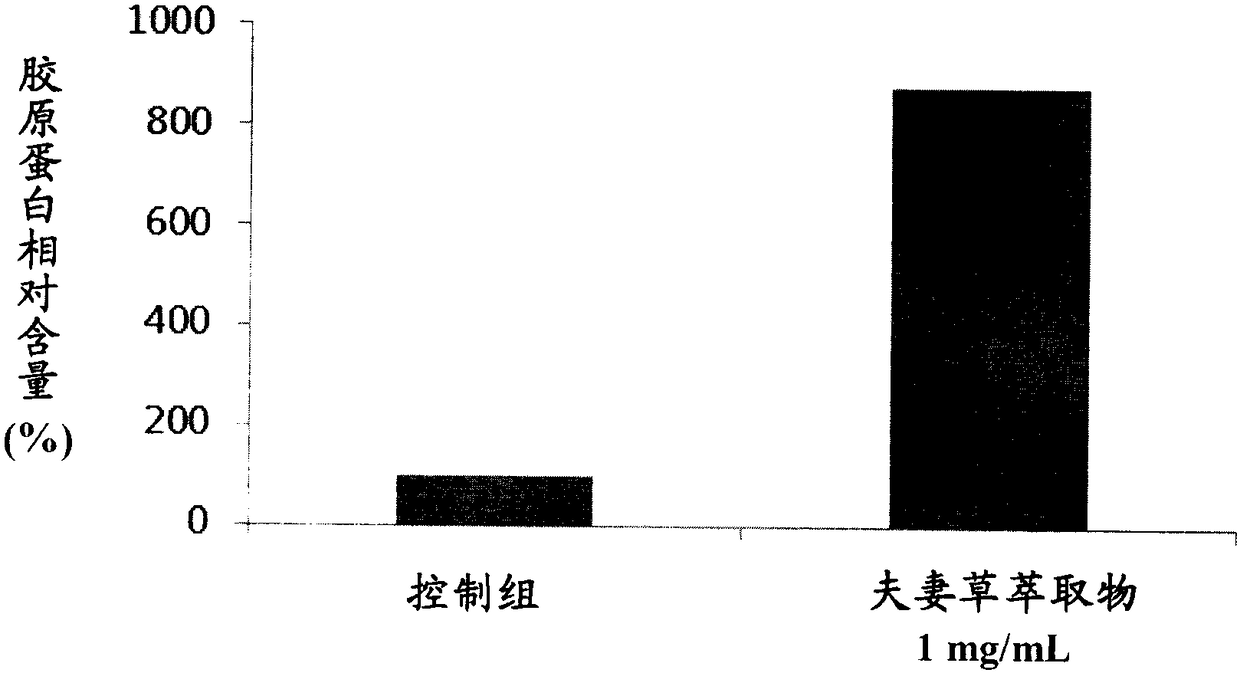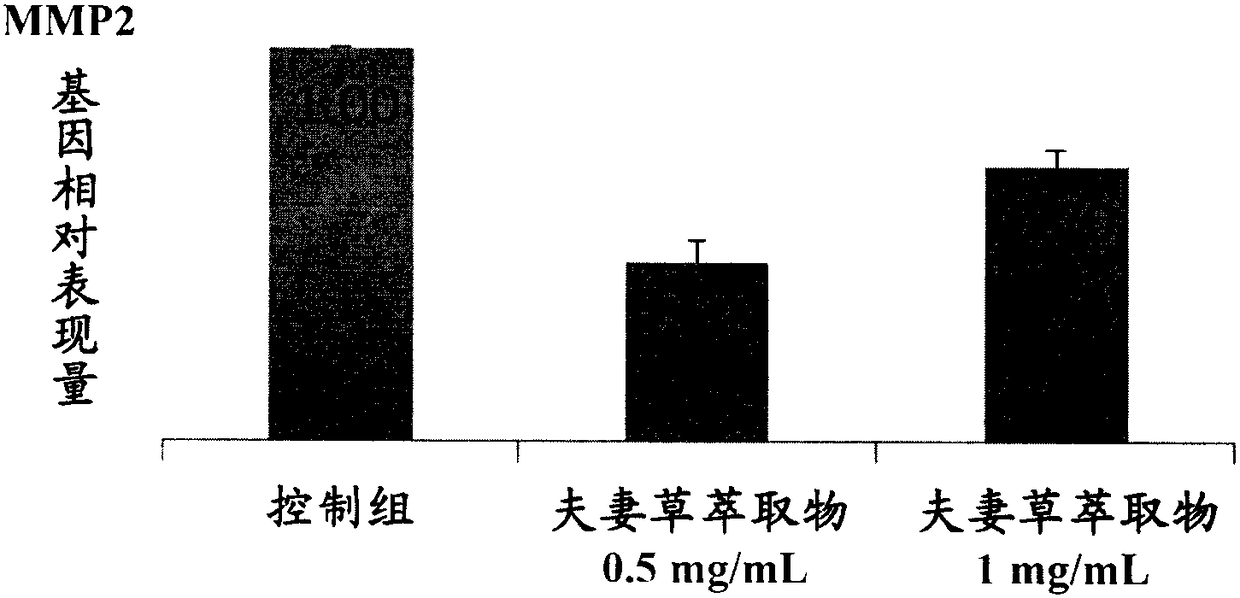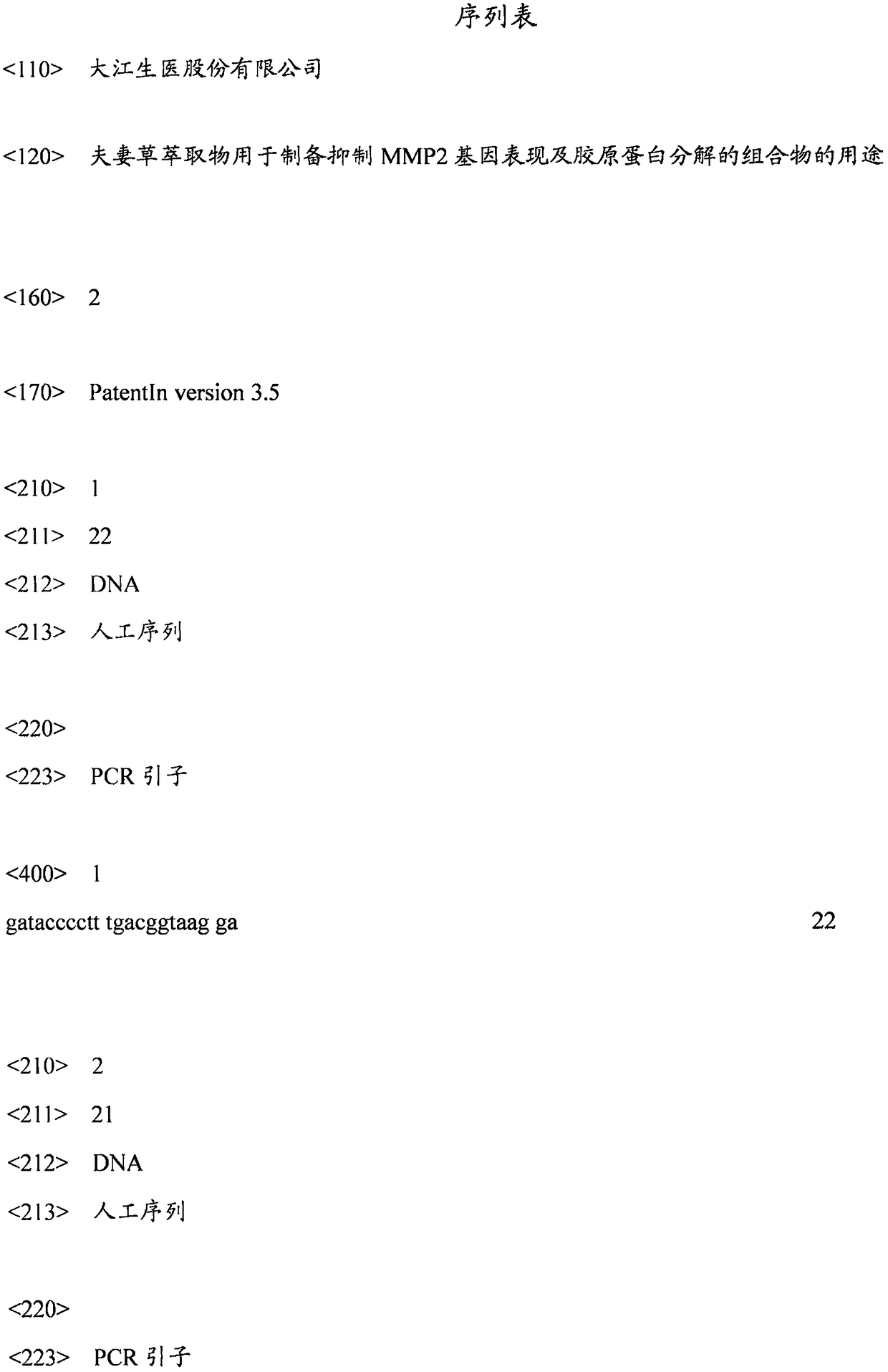Use of mimosa pudica extracts for manufacture of composition for inhibiting mmp2 gene expression and collagen degradation
A technology of collagen and gene expression, applied in the direction of drug combinations, plant raw materials, cosmetic preparations, etc., can solve the problems of limited skin collagen synthesis and inability to effectively supplement collagen
- Summary
- Abstract
- Description
- Claims
- Application Information
AI Technical Summary
Problems solved by technology
Method used
Image
Examples
Embodiment 1
[0027] Preparation of Herba Malawi Extract
[0028] Firstly, wash and dry the Herba Aphrodisiac, and grind it with a homogenizer. Secondly, water, alcohols, or alcohol-water mixtures are used as solvents to extract the homogeneous herba cuspidatum, and the liquid-solid ratio of the mixture of the solvent and the homogeneous herba matura is 5-20:1-5. The extraction temperature is between 50°C-100°C, preferably 75°C-95°C. The extraction time in this embodiment is 0.5-2 hours.
[0029] After cooling down to room temperature, the Herba Malawi extract obtained through the above extraction steps can be filtered through a 400-mesh filter to remove residual solids. The filtered Kumarinaceae extract can be further concentrated under reduced pressure at 45° C. to 70° C. to obtain a concentrated product. In order to obtain the solid extract of Herba cuspidatum, the extract of Herba cuspidatum concentrated under reduced pressure can be spray-dried to remove the solvent, so as to obtain...
Embodiment 2
[0031] Matrimony pratense extract enhances collagen production in fibroblasts
[0032] In order to test the effect of the extract of Coyote husbandry of the present invention on the collagen production of skin cells, the present embodiment uses the collagen content test to analyze the collagen production of human skin fibroblasts CCD-966SK after being treated with the water extract of Coppinwort. Quantitative changes. First, human dermal fibroblasts were seeded at 2×104 cells / well in each well of a 24-well dish containing 500 μL of cell culture medium. After culturing at 37°C for 24 hours, the cell culture medium was removed and the cells were washed with PBS solution. . Next, 500 μL, 1 mg / mL water extract of Herba Kumarin and 500 μL of FBS-free cell culture medium were added to the cells in each well, or cells were only treated with 500 μL of FBS-free cell culture medium as a control group. After the aforementioned two groups of cells were cultured at 37° C. for 48 hours, t...
Embodiment 3
[0035] Collagen officinalis extract inhibits the expression of genes related to collagen breakdown
[0036] In order to further explore the gene expression regulation effect of the extracts of the husbandry grass of the present invention on the gene expression of collagen decomposing enzymes, the present embodiment uses Q-PCR to measure the human dermal fibroblasts CCD-966SK (BCRC 60153) treated with the water extract of the husbandry grass, Changes in the expression of genes related to collagen breakdown. First, human dermal fibroblasts were seeded at 1.5×105 cells / well in each well of a 6-well plate containing 2 mL of cell culture medium, and cultured at 37°C. Next, the cells were treated with 0.5 mg / mL or 1 mg / mL of water extract of Herba Kumarin for 24 hours, and then the treated cells were collected for Q-PCR. The human dermal fibroblasts in the control group were treated with the cell culture medium without water extract of Kumarinaceae.
[0037] The relative expressio...
PUM
 Login to View More
Login to View More Abstract
Description
Claims
Application Information
 Login to View More
Login to View More - R&D Engineer
- R&D Manager
- IP Professional
- Industry Leading Data Capabilities
- Powerful AI technology
- Patent DNA Extraction
Browse by: Latest US Patents, China's latest patents, Technical Efficacy Thesaurus, Application Domain, Technology Topic, Popular Technical Reports.
© 2024 PatSnap. All rights reserved.Legal|Privacy policy|Modern Slavery Act Transparency Statement|Sitemap|About US| Contact US: help@patsnap.com










